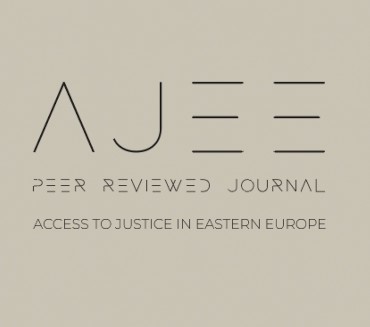Summary: 1. Introduction. – 2. Theoretical substantiation of the significance of arbitrariness prevention and its practical implementation. – 2.1. The aim and research methods to study arbitrariness, its manifestation and prevention. – 3. Arbitrariness prevention in the light of classical concept (doctrine) of the rule of law and advice of the Venice Commission. – 4. The Proposals of the Constitutional Court of Ukraine regarding national monitoring tools to achieve the efficiency of the rule of law. – 5. Conclusions.
Background: Countries of Western political and legal tradition and former socialist countries of Central and Eastern Europe need further arbitrariness prevention in order to establish the rule of law both logically and taxonomically: idea (ideal) – prerequisite (guarantee) – achieving the efficiency of the rule of law. They also require practical application, which reflects the priorities of national interests based on freedom and respect to human dignity. The article contextualises arbitrariness prevention as an applied instrumental concept, essential for bringing the rule of law to the state, which allows the prevention of undue public authorities’ intervention in the process of their discretionary powers in particular spheres of human life. It also seeks the most appropriate approach to its use in combination with other standards and requirements in order to assess and summarise real daily practices of the rule of law existing in many modern societies and states. Functional application of arbitrariness prevention as a means of legal reasoning to access constitutional justice is substantiated. Concentration on the enhancement and implementation of the current Ukrainian mechanism to provide the monitoring of power use by the state and human immunity from arbitrary actions of the state authorities is gaining a real practical value. It is extremely relevant under the conditions of court control over the constitutionality of the state intervention in social and other types of human rights.
Methods: Research on arbitrariness prevention in the international and national political and legal context is based on the definition of the rule of law derived from the provisions of the dialectic correlation of natural law and the positivist legal approach. The potential of the latter approach for the provision of sufficient restriction of the power is also very important. Historic, hermeneutic, systemic, structural, axiological, and instrumental approaches promote arbitrariness prevention as a particular specific idea (ideal), which consolidate the advance of social and legal thought as well as the practices of public authority functioning. They also contribute to its superposition over state arbitrariness as a permanently active and clear requirement, instruction and conceptual component, principal rule (sub-rule), and commonly shaped standard, as well as one of non-disputable prerequisites and guarantees of a counter to malpractice of discretionary powers. In this article the theoretical and comparative generalisation of the traditions of the perception of the rule of law proves and confirms, on the ground of therelevant constitutional provisions, and specific court decisions resulted in quite clear reasoning in favour of their implementation in the real legal order and provided a person the possibility of exercising their guaranteed right to appeal to the court against the actions of the state within the scope of the activities of the Constitutional Court of Ukraine.
Results and conclusions: The content and meaning of arbitrariness prevention are presented. They reflect the value-normative potential of the rule of law and serve as the basis for the development of the entire set of national constitutional and legal structures, current legislation, mechanisms and procedures for its objective evaluation. The legal positions of the Constitutional Court of Ukraine regarding the introduction of the mechanism of ensuring control over the use of power by the state and protecting people from arbitrary actions of authorities as well as its subordination to achieving the effectiveness of the rule of law are examined in the given article.

